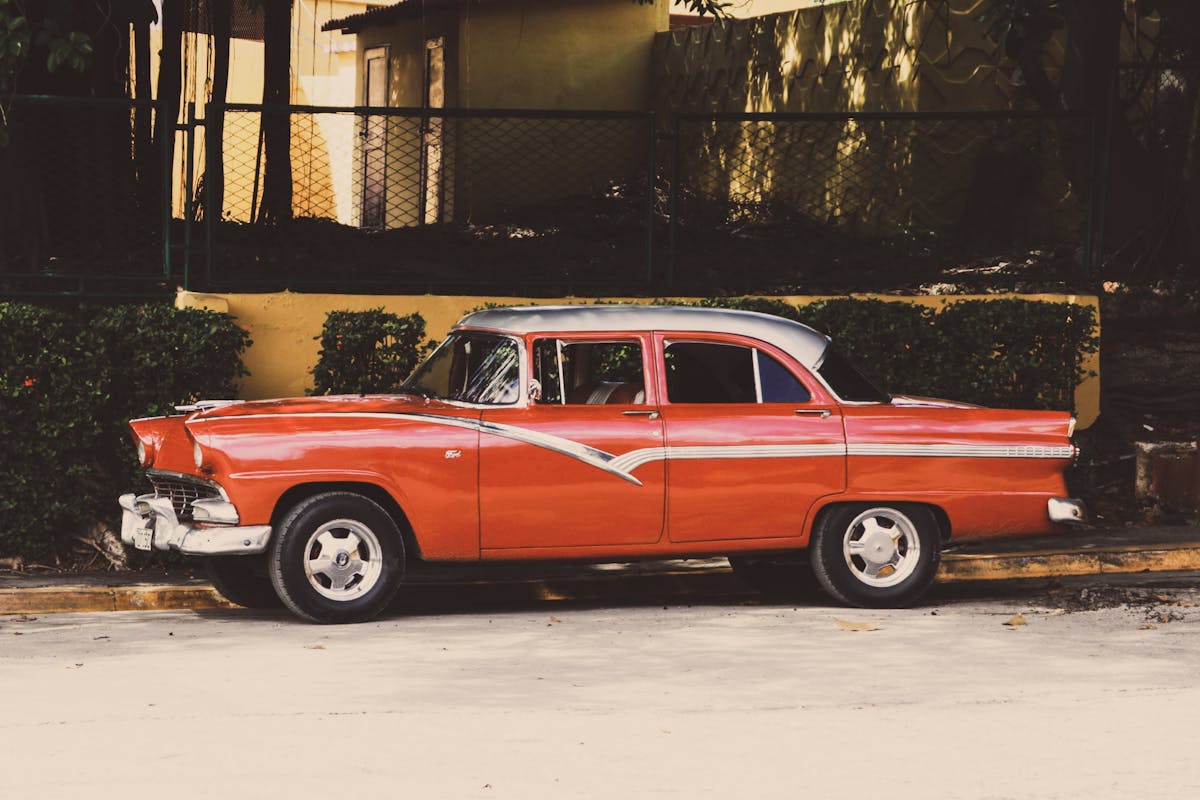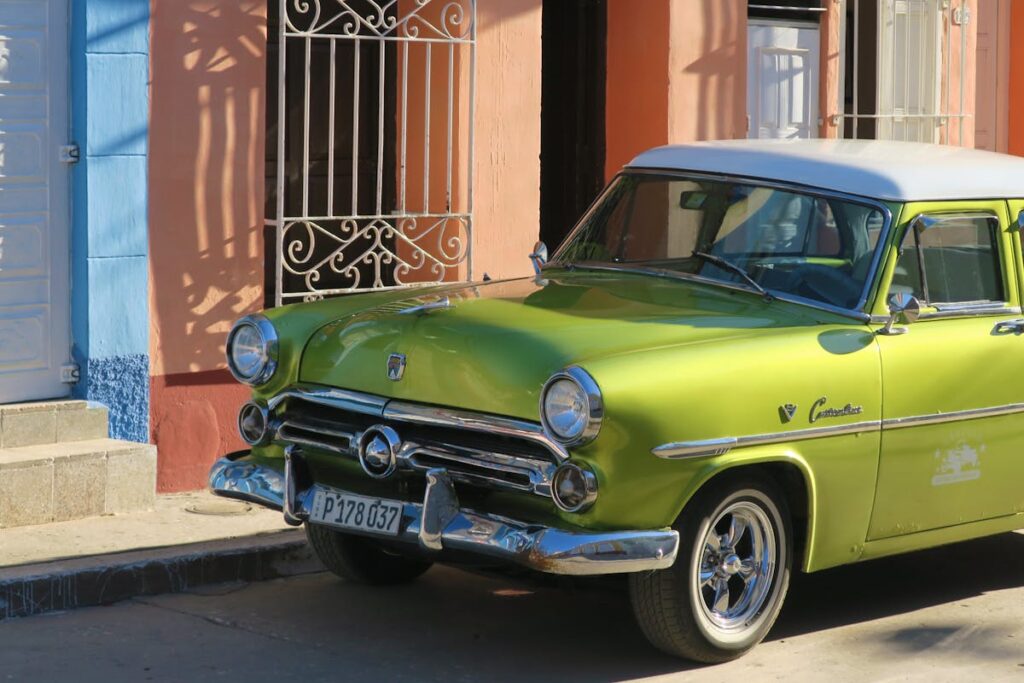The market for classic cars can be a challenging terrain to navigate, particularly when it comes to selling. With an array of potential outlets, from online auctions and social media platforms to consignment with dealerships and networking within car collectors clubs, it’s essential to discern which route is most effective for your unique vehicle. In this discussion, we will explore these various avenues in depth, providing vital insights that may well enhance your selling experience and potentially increase your return on investment.
Key Takeaways
- Online platforms like Bring a Trailer, eBay Motors, and AutoHunter offer easy-to-use auctions for selling classic cars globally.
- Classic car websites and social media platforms like Instagram, Facebook Marketplace, and Twitter aid in connecting with a global audience of buyers.
- Consigning with reputable dealerships can provide access to their expertise and established customer bases for successful sales.
- Local car shows and events provide opportunities for networking, effective display strategies, and negotiating sales in person.
- Advertising in auto trade magazines and networking in car collectors clubs can help reach a dedicated and passionate audience.
Online Auctions for Classic Cars
In the domain of classic car sales, online auctions have emerged as a thriving marketplace. This digital platform, with its global reach, has revolutionized the way collectors and enthusiasts buy and sell classic cars. The online auction platforms offer a wide array of vehicles, allowing sellers to reach a broader audience and buyers to find specific models they might not find locally.
Successful transactions in these online auctions often depend on well-planned bidding strategies. Sellers need to set a reasonable reserve price, while buyers should be aware of the market value of the car they intend to bid on. Many auction platforms provide detailed car information, including condition, provenance, and estimated value, to inform bidding strategies.
Online auction platforms like Bring a Trailer, eBay Motors, and AutoHunter have gained popularity for their ease of use and extensive services. They not only facilitate the bidding process but also handle aspects like listing creation, transaction security, and even shipping coordination. Nevertheless, potential sellers must be aware that these platforms charge fees, which should be factored into their selling strategy.
Consigning With Dealerships
Turning to a trusted dealership can be another effective approach for selling classic cars. This method combines the dealer’s expertise and established customer base with your desire to sell, creating a mutually beneficial situation.
Choosing the right dealership is vital, and this is where dealer reputation comes into play. A respected dealer often has a large network of potential buyers and can guarantee your classic car is seen by the right audience. Additionally, a reputable dealer can provide an accurate valuation of your car, boosting your chances of a successful sale.
When consigning with dealerships, it’s also essential to understand the commission structures they operate under. Typically, a dealership will charge a percentage of the selling price as their fee. This percentage can vary, so it’s important to clarify this upfront to avoid any surprises later.
Local Car Shows and Events
Local car shows and events present a unique platform for selling classic cars. These events offer opportunities for networking with potential buyers, displaying your vehicle in a manner that attracts attention, and negotiating sales on the spot. We will explore these aspects to understand how to effectively utilize car shows and events to sell classic cars.
Networking at Car Shows
Attending countless car shows and local events can provide an unmatched opportunity for classic car sellers. These platforms allow sellers to meet potential buyers, make connections with fellow enthusiasts, and showcase their classic vehicles to a wider audience. It’s vital to understand the car show etiquette, which includes being respectful to other participants and their vehicles, answering inquiries about your car accurately and politely, and maintaining a professional demeanor.
Networking at car shows isn’t just about making verbal connections. Classic car photography plays a significant role in this process. High-quality photos can capture the attention of potential buyers, even after the event has concluded. Sellers should invest in a good camera and learn the basics of car photography, including proper lighting, angle selection, and focus on the car’s most unique features.
Sellers should also utilize social media platforms to share these pictures, tagging the car show or event for more visibility. This not only aids in making a sale but also helps to build a reputation within the classic car community. Remember, networking isn’t a one-time activity; it’s a continuous process that can increase the chances of selling your classic car.

Event Display Strategies
Mastering the art of display at local car shows and events can greatly enhance the visibility of your classic car and catch the eye of potential buyers. A well-executed event marketing strategy can be the vital element that distinguishes your vehicle from the others and attracts serious buyers.
Promotional materials, such as high-quality photographs, detailed information about the car’s history and condition, and even the car itself, should be presented in an eye-catching, professional manner to attract potential buyers. Display your car at strategic locations within the event, preferably near the entrance or other high-traffic areas to maximize exposure.
In addition to the car itself, your display should include other promotional materials that help tell the story of your classic car. This could be anything from period-correct accessories, awards, or media featuring your vehicle. These items not only attract attention but also provide conversation starters that invite potential buyers to engage with you.
Effective event display strategies require careful planning and execution. It is important to understand the audience at each event, and tailor your display to appeal to those attendees. The goal is to make your classic car stand out, spark interest, and ultimately, secure a sale.
Negotiating Sales at Events
When it comes to closing a sale at local car shows and events, the art of negotiation plays an essential role. The success of the negotiation process often hinges on the seller’s ability to manage price expectations and apply effective closing techniques to secure a deal.
Setting realistic price expectations is critical. Classic car sellers should conduct thorough market research to determine the average selling price for their specific make and model. This data should be used as a benchmark when establishing the asking price. It’s important to remember that potential buyers will likely negotiate for a lower price, so the initial asking price should take this into consideration.
Effective closing techniques can facilitate the negotiation process. One effective strategy is the assumptive close, where the seller assumes the deal is done and begins discussing the next steps, subtly encouraging the buyer to agree. Another technique is the direct close, where the seller straightforwardly asks if the buyer is ready to purchase. This direct approach can often lead to a closed sale, especially when the buyer shows strong interest.
Listing on Classic Car Websites
A myriad of classic car websites exist, offering an ideal platform for selling your treasured vehicles. These online marketplaces connect sellers with potential buyers from around the globe, broadening the scope of your reach and increasing the likelihood of a successful sale.
Key to making the most of these websites is ensuring your listings are attractive and informative. This is where classic car photography and detailed vehicle descriptions come into play. High-quality, well-lit photos that showcase your vehicle from a variety of angles can make a significant difference in attracting potential buyers. These photos should ideally highlight the vehicle’s unique features, condition, and overall aesthetic appeal.
In addition to photography, detailed vehicle descriptions are equally important. The description should provide thorough information about the car’s make, model, year, condition, mileage, and any modifications or restorations. The history of the vehicle, such as previous owners, awards won, or notable events it has participated in, can also add value to your listing.
Utilizing Social Media Platforms
Social media platforms are powerful tools for selling classic cars, offering a broad reach to potential buyers. Instagram’s visual appeal makes it ideal for showcasing vehicles, while Facebook Marketplace provides an effective platform for direct sales. Meanwhile, Twitter’s promotional capabilities can aid in increasing visibility and engagement with prospective purchasers.
Maximizing Instagram for Sales
Harnessing the power of Instagram, a visual-centric platform, can considerably boost the sales of classic cars. Key to achieving this is the development of a strong strategy that incorporates engaging content and consistent interaction with the Instagram community.
To begin, focus on creating a visually appealing and professional profile. Since Instagram is a photo-based platform, high-quality, well-composed images of the classic cars you’re selling are essential. Showcasing different angles, interiors, and unique features of the cars will attract potential buyers.
Next, Instagram strategies should include the utilization of relevant hashtags. Hashtags are instrumental in helping users discover your content. Use a mix of broad, popular hashtags and more specific ones to reach a wider audience.
Engaging content is not limited to photos. Stories, reels, and IGTV can be used to provide a more thorough view of the cars, making it easier for potential buyers to make informed decisions.
Regularly engaging with followers, responding to comments, and reposting user-generated content will foster a sense of community, thereby enhancing the credibility of your profile.
Ultimately, maximizing Instagram for sales entails a well-rounded strategy that combines engaging visuals, effective use of platform features, and consistent interaction with the audience.
Facebook Marketplace Strategies
The Facebook Marketplace has emerged as a powerful platform for selling classic cars. This digital bazaar provides sellers with direct access to an extensive network of potential buyers. As with any marketplace, it is vital to understand the best strategies to effectively navigate and utilize this platform.
One key strategy involves identifying your target audience. Facebook Marketplace boasts a diverse user base, hence, sellers should craft their car listings to appeal to the specific demographics interested in classic cars. This could involve highlighting the car’s unique history or its nostalgic appeal.
Pricing strategies are another essential aspect. While listing your car at a competitive price may attract more potential buyers, it is important to balance this with the objective of obtaining a fair return on your investment. Researching similar listings can provide insight into the current market price for your classic car.
Effective Twitter Promotions
With millions of active users, Twitter stands as a strategic platform for promoting and selling classic cars. The key to effective Twitter promotions lies in the strategic use of Twitter hashtags. When used correctly, they can greatly increase the visibility of your promotional tweets, leading to higher audience engagement.
Influencer partnerships can also be a game-changer. By partnering with influencers who have a large following, you amplify your reach, giving your classic cars more exposure. This approach is particularly effective if the influencer’s audience aligns with your target market.
Tweet scheduling is another important aspect of Twitter promotions. By scheduling tweets for when most of your followers are online, you can maximize engagement. Visual content, such as photos and videos of your classic cars, can also boost engagement rates considerably.
Retweet strategies, such as encouraging followers to retweet your posts, can help you reach a wider audience. Additionally, analytics tracking is essential to measure the effectiveness of your Twitter promotions. It helps you identify what works and what doesn’t, allowing you to refine your strategy for better results. Overall, Twitter provides a dynamic platform for selling classic cars, with numerous tools at your disposal to engage potential buyers.
Advertising in Auto Trade Magazines
Despite the rise of digital marketing strategies, advertising classic cars in auto trade magazines remains a viable and effective sales method. These magazines, often specialized in specific types of vehicles, such as classic or luxury cars, have a dedicated readership base that is already interested and invested in the automotive world. This targeted, passionate audience is considerably more likely to engage with advertisements and make purchases compared to the general public.
To capitalize on this, sellers should consider various advertising strategies. Full-page colored advertisements may catch the reader’s attention, but they often come with hefty price tags. Smaller ads, strategically placed near relevant articles or in the classifieds section, can be just as effective and more cost-efficient.
As many auto trade magazines offer both print and digital versions, sellers can potentially reach a broader demographic. Magazine subscriptions provide advertisers with a steady, predictable audience, and offer the chance to build a reputation within the community over time.
Networking With Car Collectors Clubs
Have you considered the potential of networking with car collectors clubs when selling classic cars? The networking opportunities provided by these clubs can open up avenues for profitable sales, given the sheer enthusiasm and purchasing power of its members.
Classic car associations and restoration clubs are often teeming with potential buyers. Regular collector meetups and vintage car rallies are prime venues where you can showcase your cars to interested parties. Additionally, getting involved in exclusive auctions and trade shows can greatly increase your visibility to a discerning audience.
Membership benefits of these clubs often include access to online forums and enthusiast networks. This digital access allows for a broader reach, enabling you to advertise to a global audience of classic car aficionados. Moreover, many clubs run referral programs, which could result in potential leads and sales.
In essence, networking with car collectors clubs can be a valuable strategy when selling classic cars. It provides exposure to a network of passionate buyers, while offering multiple platforms to showcase your classic cars. Make the most of these opportunities to secure the best possible deals for your vehicles.
Frequently Asked Questions
What Are the Tax Implications of Selling a Classic Car?
The tax implications of selling a classic car involve potential capital gains tax on profit and applicable sales tax. The amount of tax can vary based on the sale price and individual tax circumstances.
Can a Classic Car Be Sold Internationally and Whats the Process?
Yes, classic cars can be sold internationally. The process involves understanding international regulations, managing shipping logistics, and ensuring compliance with customs. Professional services are available to assist with these complex procedures for a successful transaction.
What Are the Best Practices for Pricing My Classic Car?
Determining the best price for your classic car involves careful classic car valuation, researching market trends, and implementing effective pricing strategies. Consulting industry experts and using online valuation tools can also provide valuable insights for accurate pricing.
What Are the Potential Legal Issues When Selling a Classic Car?
Potential legal issues when selling a classic car can include inaccuracies in a vehicle’s title transfer and inadequate disclosure of known defects. Both can lead to disputes or legal action post-sale.
How Can I Sell a Classic Car if Its Not in Running Condition?
Selling a non-running classic car involves exploring restoration options or selling as-is. Use targeted advertising strategies to reach enthusiasts who appreciate the vehicle’s potential, despite its current condition. Transparency about its status is essential.

